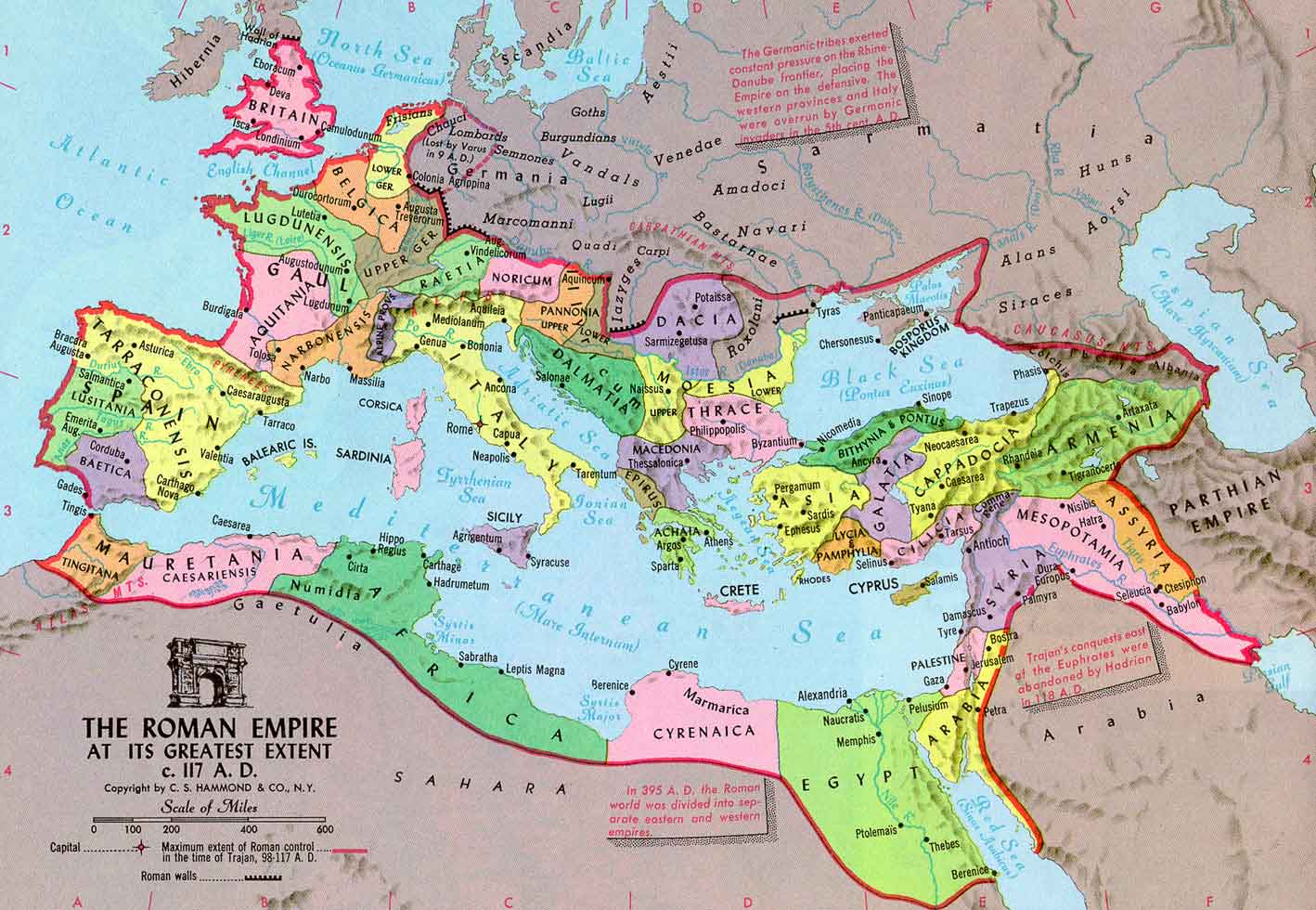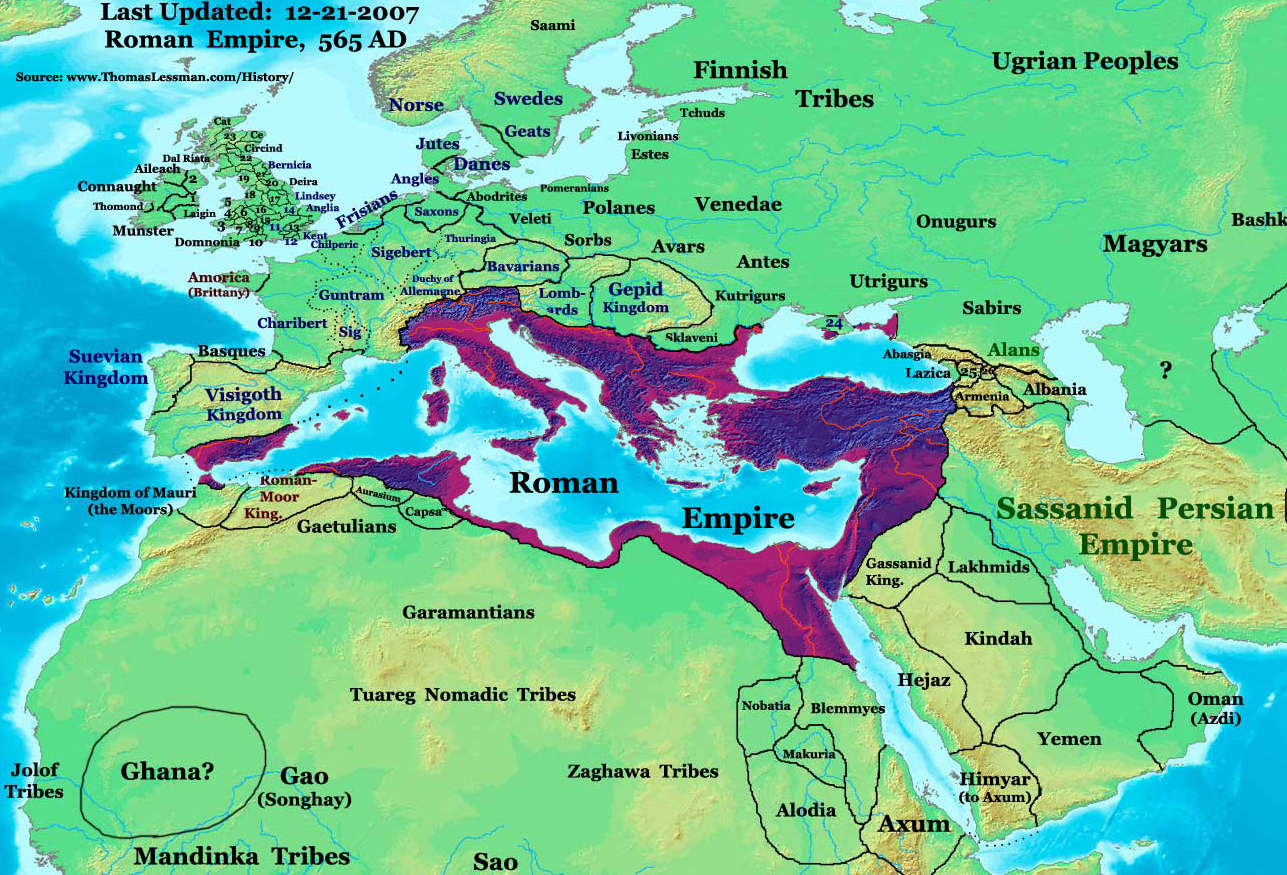Skip to comments.
Plague Helped Bring Down Roman Empire
LiveScience ^
| May 10, 2013
| Charles Choi
Posted on 05/12/2013 6:14:17 PM PDT by SunkenCiv
...The bacterium that causes plague, Yersinia pestis, has been linked with at least two of the most devastating pandemics in recorded history. One, the Great Plague, which lasted from the 14th to 17th centuries, included the infamous epidemic known as the Black Death, which may have killed nearly two-thirds of Europe in the mid-1300s. Another, the Modern Plague, struck around the world in the 19th and 20th centuries, beginning in China in the mid-1800s and spreading to Africa, the Americas, Australia, Europe and other parts of Asia.
Although past studies confirmed this germ was linked with both of these catastrophes, much controversy existed as to whether it also caused the Justinianic Plague of the sixth to eighth centuries. This pandemic, named after the Byzantine emperor Justinian I, killed more than 100 million people. Some historians have suggested it contributed to the decline of the Roman Empire.
To help solve this mystery, scientists investigated ancient DNA from the teeth of 19 different sixth-century skeletons from a medieval graveyard in Bavaria, Germany, of people who apparently succumbed to the Justinianic Plague.
They unambiguously found the plague bacterium Y. pestis there...
The researchers said these findings confirm that the Justinianic Plague crossed the Alps, killing people in what is now Bavaria. Analysis of the DNA suggests that much like the later two pandemics of plague, this first pandemic originated in Asia...
The researchers now hope to reconstruct the whole genome sequence of the plague strain in these ancient teeth to learn more about the disease, Scholz said.
(Excerpt) Read more at news.discovery.com ...
TOPICS: History; Science; Travel
KEYWORDS: 536ad; ad536; blackdeath; blackplague; bubonicplague; byzantineempire; catastrophism; godsgravesglyphs; helixmakemineadouble; justinian; justinianplague; justiniansplague; outbreaks; plagues; putlichealth; romanempire; yersiniapestis
Navigation: use the links below to view more comments.
first previous 1-20, 21-40, 41-60, 61-80, 81-91 next last
To: SunkenCiv
Did not help that European cultural superstitions included fear of felines which led rats running wild if left unchecked. Also, any city that took their public work projects for granted were fair game. Once the pandemic stage hit (fleas/ticks), then all bets were off.
41
posted on
05/12/2013 8:12:35 PM PDT
by
rollo tomasi
(Working hard to pay for deadbeats and corrupt politicians.)
To: Verginius Rufus
I recommend ”Count Belisarius”, a novel by Robert Graves about that era.
42
posted on
05/12/2013 8:13:30 PM PDT
by
kabumpo
(Kabumpo)
To: juma
I recommend the novel ”Count Belisarius” by Robert Graves - a fascinating account of that period, the religion and the politics.
43
posted on
05/12/2013 8:16:37 PM PDT
by
kabumpo
(Kabumpo)
To: qam1
That’s like saying the 1918 Spanish flu help win the American Revolution
I blame Dr Who.
44
posted on
05/12/2013 8:20:57 PM PDT
by
Rides_A_Red_Horse
(Why do you need a fire extinguisher when you can call the fire department?)
To: SunkenCiv
I was given to understand that based on forensics and historical data, that the extensive use of lead for carrying water and in eating/drinking utensils was a major contributor to the decline. Lead poisoning causes all sorts of nasty mental and physical problems.
45
posted on
05/12/2013 8:34:53 PM PDT
by
ChildOfThe60s
(If you can remember the 60s.....you weren't really there)
To: kabumpo
Justinian was from near Skopje in the present-day Republic of Macedonia--one of the last emperors who spoke Latin as his first tongue (although my guess is that Cicero would have cringed at what passed for Latin in the rural Balkans in the sixth century). The future pope Gregory the Great spent some time in Constantinople a little later and somehow managed not to learn Greek, so there must have been a critical mass of Latin-speakers even in Constantinople.
In the second half of the sixth century or first part of the seventh century much of the Balkans was overrun with Slavs (including some parts of Greece which were later re-hellenized). Although much of the territory was again under the control of Constantinople from time to time, that must have tipped the scales heavily in favor of the Greek language as opposed to Latin. Justinian's law code was in Latin but already a lot of the new laws were being issued in Greek.
To: kabumpo
There was a proverb date obolum Belisario based on the legend that Belisarius later was a poor beggar in Constantinople--"give an obol to Belisarius" (an obol was one-sixth of a drachma). There is a cartoon thought to be by Benjamin Franklin from the era of the American Revolution which displays this proverb (but spells Belisarius' name with two L's).
To: Verginius Rufus
I wonder if the Romans would have tried to further exploit their victory against the Parthians in that war if that plague hadn’t broke out. It seems their territorial gains were minimal in light of the victory.
48
posted on
05/12/2013 9:05:59 PM PDT
by
Aetius
To: Verginius Rufus
The Robert Graves novel covers that.
49
posted on
05/12/2013 9:12:49 PM PDT
by
kabumpo
(Kabumpo)
To: muawiyah
50
posted on
05/12/2013 9:41:30 PM PDT
by
KC Burke
(Plain Conservative opinions and common sense correction for thirteen years)
To: SunkenCiv
51
posted on
05/12/2013 9:55:41 PM PDT
by
GeronL
(http://asspos.blogspot.com)
To: Aetius; SunkenCiv; no-to-illegals; All
The Romans did not have much luck fighting the Parthians. Crassus, the third member of the Roman triumvirate of which Pompey and Julius Caesar were the other two, wanted to make a name for himself before he got too old. He was about 54. Pompey had Spain and the west, Caesar had the center and he had the East. The march into Parthian territory became a military disaster. He and his son were both killed, and young Cassius managed to bring about 10,000 troops back to Syria to preserve the Roman hold there. Years later you may recall that Cassius was one of the ringleaders who killed Caesar because he was “too ambitious.” I always wondered what his ambition was, until I read this piece of history. Then I realized that Caesar’s ambition was to restore Roman honor by conquering Parthia. Dumb move, and also a dumb move 200 years later. And also a dumb move 10 years ago.
Regarding rats. The rat of the plague was the black rat, which was primarily a house and roof rat. It lived rather intimately with its victims, spreading fleas in the house. The Norway gray rat which replaced the Black rat is a sewer and cellar rat which has less contact with humans. We have endemic Bubonic plague in around 17 western states among the wild rodent population. However it seems the Hanta virus is more dangerous as you can get it from dust while sweeping mouse droppings, rather than the flea bites needed for plague.
To: gleeaikin
gleenaikin, I can always count on you to cause me more research. LOL ...
53
posted on
05/12/2013 11:46:07 PM PDT
by
no-to-illegals
(Scrutinize our government and Secure the Blessing of Freedom and Justice)
To: SunkenCiv
Yep and few people realize that domed churches are a Christian, not Moslem, invention.
54
posted on
05/13/2013 3:36:07 AM PDT
by
1010RD
(First, Do No Harm)
To: Standing Wolf
Informative read. Thanks for posting.
I second that.
***
Let me add my thanks, as well.
55
posted on
05/13/2013 5:34:37 AM PDT
by
Bigg Red
(Restore us, O God of hosts; let your face shine, that we may be saved! -Ps80)
To: muawiyah
Thanks. Very informative comments, as usual.
Please tell me we have the pharmacological armory in case of another onslaught of Y. pestis.
56
posted on
05/13/2013 5:42:54 AM PDT
by
Bigg Red
(Restore us, O God of hosts; let your face shine, that we may be saved! -Ps80)
To: Verginius Rufus; kabumpo; qam1; SunkenCiv
quam1:
"Ummmm, the Roman Empire ended in 479 and was well on it's way out, long before Justinian." kabumpo: "Justinian was in Byzantium, the eastern part of the empire that lasted longer."
Verginius Rufus: "Justinian was from near Skopje in the present-day Republic of Macedonia--one of the last emperors who spoke Latin as his first tongue..."
Just to be clear, here is the old Roman Empire at its peak, 2nd Century AD:

And here is the new Eastern Roman Empire (possibly exaggerated?), at its peak under Justian, 6th century AD:

The Eastern Empire fell in 1453, and now, as the song says:
"So take me back to Constantinople
No, you can't go back to Constantinople
Been a long time gone, Constantinople
Why did Constantinople get the works?
That's nobody's business but the Turks"
;-)
57
posted on
05/13/2013 8:25:12 AM PDT
by
BroJoeK
(a little historical perspective....)
To: Bigg Red
That's a really good question ~ they treat all detected cases with antibiotics that seem to work. But I don't believe they go out and track down the infected rats and other susceptible rodents!
So, it's out there poised to strike every time the conditions are right. We are currently coming out from under a lengthy drought ~ well over a decade West of the 100 degree line. The rains are aiding the recover and grass is all over the place, and by next year the pine nut trees will be blooming and bearing.
Next Fall could be a major year for plague!
58
posted on
05/13/2013 8:48:48 AM PDT
by
muawiyah
To: SunkenCiv
this first pandemic originated in Asia
The Second one was in the 600’s. It was called ISLAM and its still with us.
59
posted on
05/13/2013 8:51:37 AM PDT
by
ZULU
((See: http://gatesofvienna.net/))
To: BroJoeK
When Diocletian SPLIT the Roman Empire, he took the Eastern Half.
BTW, he built his retirement palace in SPLIT which is right there where he SPLIT the empire.
For unaccountable reasons the on-line dictionaries trace the word origin to 1500s Dutch.
I suspect it's far older than that ~
60
posted on
05/13/2013 9:03:29 AM PDT
by
muawiyah
Navigation: use the links below to view more comments.
first previous 1-20, 21-40, 41-60, 61-80, 81-91 next last
Disclaimer:
Opinions posted on Free Republic are those of the individual
posters and do not necessarily represent the opinion of Free Republic or its
management. All materials posted herein are protected by copyright law and the
exemption for fair use of copyrighted works.
FreeRepublic.com is powered by software copyright 2000-2008 John Robinson

